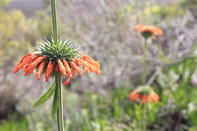Traditional Uses of South African Medicinal Plants
The medical and recreational use of indigenous plants and oils were introduced to the early Dutch settlers by local tribes and included plants like buchu, Aloe ferox (the African cousin of Aloe vera) and Cape chamomile.

These plants were chewed (Sceletium tortuosum as a mood enhancer), steeped in alcohol or vinegar for digestive complaints and worms (buchu), burned and the smoke inhaled (camphor bush for headaches) or brewed as a medicinal tea and tonic (Sutherlandia frutescens and Athrixia phylicoides).
Indigenous essential oils are very effective. Wild rosemary oil is an antiviral and helichrysum oil is used to treat snake and spider bites, while buchu oil is used for its anti-inflammatory properties.
The Sotho people use raw leaves of the Cape rose geranium as a poultice to heal wounds and abscesses, the powdered leaves of the sourplum (Ximenia caffra) are used to treat infertility and fever while its powdered root is a reputed aphrodisiac.
Local plants can be eaten raw (sour fig, marula, num num), made into jams, nuts roasted and eaten (baobab seeds and green cowpeas) and leaves eaten as vegetables (bitter melon, morogo and cowpea leaves).
Healing Properties of Indigenous Plants
The potency of South African medicinal plants have been recognized by the international pharmacological, food and cosmetic industries and are used in a variety of applications.
Devil's Claw is famed for its anti-inflammatory properties in treating arthritis, Buchu is used to give a blackcurrant flavour in the food industries, while African cold-pressed oils such as Baobab and Mongongo (also known as manketti) are widely used as excellent moisturizers and skin-regenerating agents.
The healing properties of South African indigenous plants extend to more serious diseases. Cornell University Medical College has found that African Ginger may prevent strokes, Sutherlandia frutescens ('cancer bush') and African Wormwood (Artemisia afra) are reputed to help fight cancer and diabetes, while the endangered Pepper-Bark Tree is used for venereal diseases and malaria.
A mixture made from Lippia javanica and the Knysna lily is used by the Zulu people to treat cancer, diabetes, HIV/AIDS symptoms and TB. Recent studies have found sage be a possible herbal treatment for Alzheimer’s disease.
Southern African medicinal plants and indigenous food crops are often easy to grow, can be sustainably wild-harvested and can be incorporated into home gardens and in farming systems.
It can relieve symptoms of diseases when added to diets to increase diversity and nutrient intake. It can also benefit the health and well-being of those who use it. It should be noted, however, that the use of medicinal plants and oils should not replace sound medical and dietary advice.